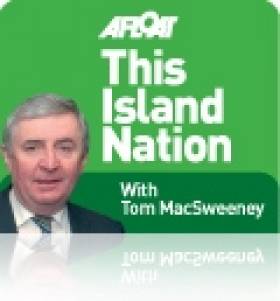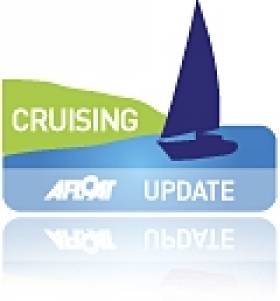Displaying items by tag: Killian Bushe
Cork Boat Builder Killian Bushe Praised for Role in ClubSwan 125 Skorpios Fastnet Race Success
Irish boatbuilder Killian Bushe from Cork Harbour has been thanked by the Nautor Swan CEO for his role in the debut success of the massive ClubSwan 125 Skorpios that took monohull line honours in the
49th edition of the Rolex Fastnet Race last night.
The ClubSwan 125, Nautor’s Swan flagship of the ClubSwan line, the high-performance range of the Finnish yard, débuted remarkable success at the Royal Ocean Racing Club’s premier event, the Fastnet Race.
Bushe built the boat in a 44-month quality project as Afloat's WM Nixon references here.
Launched last July at the BTC Yard in Pietarsaari, she has achieved the result hoped when she hit the water.
Designed by Juan K, with the interior design by Adriana Monk, for the construction of the yacht the yard employed the most brilliant minds in the sailing industry for a high technology monohull, built and conceived to be faster than the wind.
The most advanced technology has been put at sailing service for this “beast” which is testing her at one of the most awaited events of the year, the Rolex Fastnet Fastnet.
Lining up against 337 yachts, on August 8th 2021, Skorpios crossed the start line at the Royal Yacht Squadron to begin her voyage to the Fastnet Rock, an amazing show which revealed her beauty and magnificence.
After sailing through the English Channel and across the Celtic Sea, on Monday Skorpios became the first monohull to round southwest Ireland’s most famous rock. Skorpios rounded just astern of the final Ultime trimaran, the Jacek Siwek-skippered elongated ORMA 60, Ultim’emotion 2, but of more concern was a boat less than half her length nipping at her heels.
 Irish boatbuilder Killian Bushe from Cork Harbour
Irish boatbuilder Killian Bushe from Cork Harbour
After rounding the rock, the breeze dropped off and Skorpios extended the lead on her rival for the line honours victory, George David’s Rambler 88, previous line honours winner, along with the rest of the IMOCA fleet.
Speaking with the Royal Ocean Racing Club following their win in Cherbourg, Skipper Fernando Echavarri was relieved to have come through the Rolex Fastnet Race with the boat intact. “The boat is very strong, we backed off on speed coming out of the Solent, but so was everyone else. We had an idea of what the boat might be able to do, but we didn’t know for sure, so we learned a lot on this race.”
 After rounding the rock, the breeze dropped off and Skorpios extended the lead on her rival for the line honours victory
After rounding the rock, the breeze dropped off and Skorpios extended the lead on her rival for the line honours victory
Giovanni Pomati, CEO of Nautor, shared his thoughts following the result of Skorpios: “In this special moment in the history of Nautor I can’t avoid sending my thoughts and a great thanks to the international team that contributed to the building of this racing boat! I’d love to thank once again all the team behind: Enrico Chieffi, Juan K, Adriana Monk, Bob Wylie, Killian Bushe, Richard Ghillies, Roger Sandberg, the team at Nautor yard in Finland, the team at Nautor Swan Global Service that is now taking over the assistance to the boat, the Skorpios crew and shore team led by Fernando Echevannri and Pepe Ribes that’s contributing to the boat set up in great teamwork with Nautor. A huge congratulations and thanks to all of you for changing the pages of the sailing history.”
# ISLAND NATION – The boat builder who sailed a spinnaker on the Grand Canal in Venice, the government's maritime plan, more than 1,000 salmon caught on just two Irish rivers in one week, the polluted air of Dublin Bay, fishermen frustrated over the ban on discards, deep-sea mobile stations, a US prosecution for dumping at sea and less money for scrapping ships are amongst my topics this week.
THE ACHIEVEMENTS OF KILLIAN BUSHE
There is a legendary story in sailing about the Cork yacht Silver Shamrock which won the Half Ton World Cup Championship at Trieste in Italy in 1976. The crew celebrated by sailing the boat up the Grand Canal in Venice with a spinnaker set. It was some sight and one of the crew aboard was a young Crosshaven sailor at the time making an impression in the sport. Killian Bushe added many more sailing successes to his list before moving onto building boats as well as racing them.
The Bushe family is synonymous with boat building, tracing its achievements from Baltimore in West Cork to encompass Ringaskiddy, Rochestown and Crosshaven in Cork Harbour where George Bushe was a legendary figure. His son, Killian, is now a top builder of ocean racing yachts, having been involved in building the last four successive winners of the Volvo Ocean Race.
When Damian Foxall from Kerry, helmsman, sail trimmer and crew manager of the French yacht, Groupama, which won this year's Volvo Race waved the trophy from the winners' podium to the huge crowd watching in Galway, the thought in my mind was that this was a dual Irish international success.
While Damian sailed the yacht across 39,000 miles Killian Bushe was the lead consultant for the building of Groupama. That followed his construction of the three previous Volvo Race winners – the Swedish Ericsson, the Dutch ABN Amro One and the German Illbruck. That is a tremendous record, so it surprised me that most media reports did not mention him.
He lived in Crosshaven until 1979 and has a string of international successes as a sailor to his credit from which he turned to boat building and is now resident in Ljungskile, Sweden, where he has been called on as the boat-builder of choice, favoured by leading designers and top skippers alike whenever a high-powered strongly-resourced international challenge is taking shape. That included the Swedish challenge for the Americas' Cup, Artemis.
GOVERNMENT MARITIME PLAN
Minister for the Marine Simon Coveney has indicated that the government's Marine Co-ordination Group is currently drafting the promised national maritime programme. It is due to be launched this month. It has been indicated that the Taoiseach is taking a personal interest in the programme which is described as "Actions that will deliver an integrated marine plan for Ireland." 191 submissions were made during a consultation period.
It will be interesting to see how the programme integrates State and private sector maritime activities. The State must give decisive leadership, making it clear that the marine sphere is a national priority.
LOTS OF SALMON
Salmon are back in big numbers, with well over a thousand caught in the past week. More than 800 salmon were taken on the River Moy in what Inland Fisheries Ireland, the State organisation, says was "another extraordinary week for an Irish river," reaffirming the Moy as Ireland's premier salmon fishery. Fish were taken on worm, spinner and fly, with notable captures on the fly in particular. Amongst salmon catches reported by IFI are 26 on the Ballina Salmon Anglers' water, over 40 at Mount Falcon, 32 at the Foxford Fishery.
There have also been good catches of salmon in the Limerick area, 200 caught at Ballisodare and catches on Lough Beltra, Carrowmore Lake and the River Feale.
The ban on drift-netting remains a divisive issue for coastal communities, but it seems the leisure and tourism angling sector has benefited.
FROM THE MOON TO THE SEA
The Chinese are planning to follow space stations with a nuclear-powered mobile deep-sea station where a crew of 33 will spend up to two months at a time beneath the waves. It will have huge propellers for ocean movement and its main goal will be to search for and mine precious elements.
The China Ship Scientific Research Centre has been doing test dives of manned vehicles. Its Jiaolong model reached a record-breaking 7,020 metres at the Mariana Trench in the Pacific Ocean, the deepest in the world.
DISCARDING FISH
While the public has welcomed the ban on discarding fish caught at sea, fishermen's representative organisations are critical. It seems that the umbrella organisation which represents all the groups, the Federation of Irish Fishermen, is not happy with the Marine Minister and his officials. There are allegations of lack of consultation. Fishing organisations claim they had alternative and more effective proposals and that the Minister and his officials reacted to high-profile celebrity chefs and environmental organisations.
The official view is that all catches should be landed, while fishermen say they should not be taken in the first place and that control measures should focus on that. They have described the new ban as "dumping ashore what was dumped at sea."
CAPTAIN TO BE SENTENCED
The captain of a Panama-flagged cargo ship, found guilty of obstructing a US Coast Guard inspection after allegations that he ordered the discharge of hundreds of plastic pipes into the ocean, is to be sentenced on August 15.
38-year-old Captain Prastana Taohim of the mv.Gaurav Prem was found guilty by a jury in Mobile, Alabama. The inspection took place last September.
Witnesses had testified that Captain Taohim ordered the ship's chief officer to throw hundreds of plastic pipes into the ocean and not record the discharge in the ship's garbage record book. The plastic pipes had previously contained insecticide and were used to fumigate a grain shipment. The discharge of plastic into the sea is prohibited under the International Convention to Prevent Pollution from Ships, MARPOL.
MORE SHIPS SCRAPPED FOR LESS MONEY
An increasing number of ships, particularly older ones which cost more to operate because of fuel prices, are being scrapped by the world's shipowners, but for less money. The biggest number are the Panamax vessels, the largest to transit the Panama Canal. Fifty-six of these were sold for demolition in the first half of this year, compared with 38 a year earlier.
There is an oversupply of vessels to serve declining world trade due to the current economic difficulties of many countries. Resultant unprofitable charter rates are prompting owners to demolish vessels at a record pace. Overall tonnage sold for scrapping rose 25 per cent in the first half of this year compared with last.
A 34 per cent surge in fuel prices over the past two years has spurred scrapping as older vessels tend to consume more oil than newer ones and are considered too dear to operate. But scrap prices for ships have plunged 13 per cent. Prices have also been cut by the rupee's plunge in the past year, the worst amongst Asian currencies. India vies with China as the world's largest market for shipbreaking.
DUBLIN SEA AIR
"I rolled my considerable frame off the starboard bunk, struggled to make myself half decent and dragged my protesting body up on deck for a mouthful of freshly polluted Dublin sea air."
That introduction is headed "The Sleep Beast" and begins the book which Crosshaven sailor Rom Hyde launched on Monday night in the Port of Cork offices about his sailing career. Born in February of 1947 he claims to have had his "first sailing experience in July of the same year, but I am fairly vague about it." The book is called "What's that hanging from the starboard bow?" You don't have to be a 'yachtie' to read it!
email me your comments at [email protected]
You can follow me for more marine news and comment on Twitter: @TomMacSweeney and Afloat magazine @afloatmagazine
And on Facebook – THIS ISLAND NATION page and Afloat magazine's facebook page
Tributes Paid to Cork Boat Builder George Bushe
Sailing tributes have been paid to legendary boat builder George Bushe, who died last week aged 89.
Born in Baltimore, Co Cork, Bushe got his start in boat building through his father, who make traditional punts. From there he went on to Skinner's Boatyard in Skibbereen and worked with the late Jack O'Driscoll in Ringaskiddy.
In the 1960s and '70s he worked at the Southcoast Boatyard in Rochestown, where be built many famous racing boats for Cork's premier sailing clans - such as the Golden Apple for the late Hugh Coveney, father of Minister for the Marine Simon Coveney.
Bushe went into semi-retirement in the 1970s, working at the Royal Cork Yacht Club, restoring boats in winter and even racing his own until the mid 2000s.
His remains were carried to St Patrick's Cemetary in Crosshaven aboard the Cánóg, the last boat he completed and which he raced competitively as recently as 2006.
George Bushe is survived by his wife Carmel and their children: Bernice, Fergus, sail maker Majella, shipwright Mark, and boat builder and sailor Killian Bushe, who just last month received the Fastnet Award for his own contributions to sailing.
The Irish Examiner has more on the story HERE.
Irish Cruising Club Present Fastnet Award to Killian Bushe
So whenever a high-powered strongly-resourced international challenge is taking shape, Bushe is the boat-builder of choice, favoured by leading designers and top skippers alike. But if you have a challenge in mind and he is top of the list, please join the queue.
For at the moment, he is immersed as leading consultant in building the new Groupama 4, the top French Volvo 70 for Franck Cammas. Before that, he built the two successful Ericsson boats for the last Volvo – they took first and fourth. In fact, he has built the overall winners of the last three Volvo races. And when Groupama 4 is launched in May and signed off for the race (which starts on October 29th) Bushe returns his focus to Sweden which is now his home, where he has been involved with the Artemis challenger for the America's Cup 2013.
For that project, the designer is Juan Kouyoumdjian, and the skipper is Paul Cayard. This is stratospheric stuff, but that's the level where Bushe operates. With more than thirty years of high tech boat building experience, and a string of success that is mind-boggling, he is the gold standard. But beyond that, he is still the Crosshaven kid who started his racing on his father George's Avocet (which George designed and built), and internationally he is the spirit of Cork sailing.
His renowned skill and knowledge in the use of advanced materials and composites is such that you'd expect him to be awarded a Honorary Doctorate in chemistry from some appropriate university. But in the meantime, his special place in Irish and world sailing was honoured on Saturday March 26th with his award of the Fastnet Trophy.
This trophy is co-ordinated by the Irish Cruising Club, and it operates in very broad brief. Initiated in 2005 with its first award to Paddy Barry and Jarlath Cunnane for their pioneering circuit of the Arctic via both the Northwest Passage and the Northeast Passage, its unique lineage has been maintained by such awardees as Robin Knox-Johnston, and the most recent one, centenarian circumnavigator Bill King of Galway.
The Fastnet Trophy is envisaged as highlighting a contribution to sailing which has a sense of the unique about it, and Killian Bushe is just the man. His international sailing achievements began back in 1976 when he was one of the crew that won the Half Ton Cup at Trieste in the Cork-built Silver Shamrock. They celebrated by sailing up the Grand Canal in Venice with spinnaker set. But gradually the boat-building took over, though Bushe sails with his family in Sweden whenever he can. That is what was being celebrated on Saturday night. Killian Bushe – very good sailor, extremely good boatbuilder.


























































